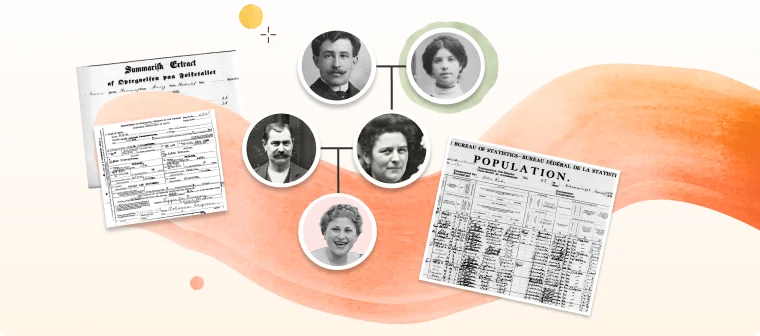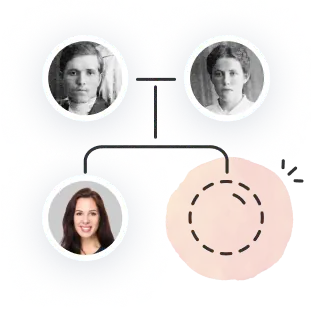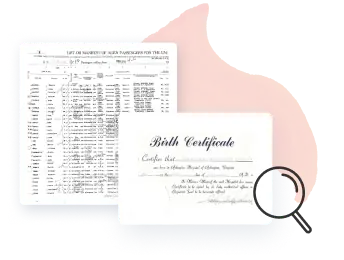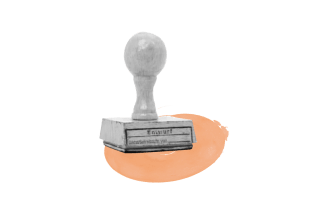Name Directory by Last Name: Last Names Starting with Ka
Explore millions of names to discover rich genealogical details and uncover your family's history
Enter a name to research
Last name meanings and origins
- Kane
The surname Kane has its historical roots primarily in Ireland, deriving from the Gaelic name "O'Cathain," which means "descendant of Cathan." The name Cathan itself is believed to be derived from the word "cath," meaning "battle." The O'Cathain clan was historically associated with the province of Ulster, particularly in County Antrim, where they were known as a prominent family. Over time, the surname evolved, with variations appearing in different regions, and it became anglicized to Kane.
- Kay
The surname Kay has historical roots that can be traced back to various origins, primarily in England and Scotland. In England, it is believed to derive from the Old Welsh name "Cai," which means "rejoice" or "to be glad," and is often associated with the legendary figure Sir Kay, a knight of King Arthur's Round Table.
- Kaiser
The surname Kaiser has its roots in the German language, deriving from the word "Kaiser," which means "emperor." This term was historically used to denote the rulers of the Holy Roman Empire, and the surname likely originated as a title for those who held positions of power or influence within the empire. The earliest recorded instances of the surname can be traced back to the medieval period in Germany, where it was associated with nobility and landowners.
- Kaufman
The surname Kaufman has its roots in the German-speaking regions of Europe, particularly among Jewish communities, where it is derived from the Yiddish word "kauf," meaning "to buy" or "to purchase." Historically, Kaufman was often associated with merchants or traders, reflecting the economic roles that many of its bearers played in their communities. The name likely emerged in the Middle Ages, a period marked by the growth of trade and commerce, and it became a common surname among those engaged in buying and selling goods.
- Katz
The surname Katz has its roots in the Hebrew word "Kohen," which means "priest." Historically, it is believed to have originated among Jewish communities in Central and Eastern Europe, particularly in Germany and Poland, where it was often used to denote descendants of the priestly class. The name Katz is an acronym derived from the Hebrew phrase "Kohen Tzedek," meaning "righteous priest." Over time, the surname became associated with various occupations, particularly in religious and scholarly roles, as many bearers of the name were involved in the Jewish clergy or in teaching roles within their communities.
- Kaplan
The surname Kaplan has its roots in the Hebrew word "kaplan," which means "falcon" or "hawk." Historically, it is believed to have originated among Jewish communities in Eastern Europe, particularly in Poland and Russia, where it was often adopted by families engaged in occupations related to the natural world, such as hunting or falconry. The name may also have been used metaphorically to signify someone with keen insight or sharp intellect, traits associated with the bird of prey.
- Kahn
The surname Kahn has its historical roots in the Hebrew word "Kohen," which means "priest." This surname is often associated with the descendants of the ancient Jewish priestly class, the Kohanim, who were responsible for performing sacred duties in the Temple in Jerusalem. The name Kahn, along with its variations such as Cohen, Cohn, and Kagan, emerged prominently in Jewish communities across Europe, particularly in Germany and Eastern Europe, during the Middle Ages.
- Kaye
The surname Kaye has its historical roots primarily in England, with its earliest appearances dating back to the medieval period. The name is believed to derive from the Old English word "cā," meaning "a key," which may have originally referred to someone who was a key bearer or a person of importance in a community, possibly a gatekeeper or someone responsible for access to a particular area.
- Kauffman
The surname Kauffman has its historical roots in the German-speaking regions of Europe, particularly among Jewish communities. The name is derived from the Middle High German word "kauffman," which translates to "merchant" or "trader." This occupational surname likely emerged in the medieval period, reflecting the economic roles of individuals who engaged in trade and commerce.
- Karlsson
The surname Karlsson has its roots in Scandinavia, particularly in Sweden, where it is derived from the patronymic naming tradition. The name literally means "son of Karl," with "Karl" being a common given name that translates to "man" or "free man" in Old Norse.
- Kaufmann
The surname Kaufmann has its roots in the German-speaking regions of Europe, deriving from the Middle High German word "kauffman," which translates to "merchant" or "trader." This occupational surname first appeared in the medieval period, particularly in the 12th century, as trade began to flourish in towns and cities across Germany. Kaufmanns were often associated with commerce, and their roles were crucial in the development of trade networks, contributing to the economic growth of their communities.
- Kato
The surname Kato has its historical roots primarily in Japan, where it is often associated with the kanji characters 加藤, which can be translated to mean "increasing wisteria." The name is believed to have originated during the feudal period, particularly among samurai families, and has been linked to various regions in Japan, notably the Kanto area. Over time, the Kato family name became prominent among the samurai class, with members often holding significant social roles and occupations, including military leaders and landowners.
- Kavanagh
The surname Kavanagh has its roots in Ireland, specifically deriving from the Gaelic name "Caomhánach," which means "descendant of Caomhán," a personal name that translates to "gentle" or "kind." The Kavanaghs are historically associated with the province of Leinster, particularly in County Carlow, where they were prominent as a Gaelic noble family. The name first appeared in historical records in the 12th century, and over time, the Kavanaghs became known for their leadership roles within the local Gaelic society, often serving as chieftains and landowners.
- Karl
The surname Karl has its roots in the Germanic name "Karl," which means "man" or "free man." It first appeared in historical records during the early Middle Ages, particularly in regions that are now part of modern-day Germany and Scandinavia. The name gained prominence through figures such as Charlemagne (Karl der Große), who was a pivotal ruler in the Carolingian Empire.
- Karr
The surname Karr has historical roots that can be traced back to various regions, particularly in Europe. It is believed to have originated from the Old Norse word "karr," meaning "rough" or "barren," which may have been used to describe a geographical feature or a person's character.
- Kaminski
The surname Kaminski has its roots in Eastern Europe, particularly in Poland, where it is derived from the word "kamień," meaning "stone." This suggests that the name may have originally been a topographical surname for someone living near a notable stone or rocky area, or it could have been occupational, referring to a stonemason or someone who worked with stone. The surname first appeared in historical records in the late Middle Ages, with variations emerging as families migrated or settled in different regions.
- Kasper
The surname Kasper has its roots in the given name "Caspar," which is derived from the Persian name "Ghazpar," meaning "treasurer." Historically, the name is most commonly associated with one of the Three Wise Men, or Magi, who visited Jesus after his birth, often depicted as a figure of wisdom and wealth. The surname Kasper first appeared in Europe during the Middle Ages, particularly in German-speaking regions, where it was adopted as a family name.
- Kayser
The surname Kayser has its historical roots in the German-speaking regions of Europe, particularly in Germany and Austria. The name is derived from the Middle High German word "keiser," which means "emperor" or "caesar," indicating a noble or high-ranking lineage.
- Karloff
The surname Karloff has its historical roots in Eastern Europe, particularly among Slavic populations. It is believed to derive from the given name "Karl," which means "man" or "free man" in Germanic languages, combined with the Slavic suffix "-off," indicating "son of" or "descendant of." The surname likely first appeared in the 19th century, as surnames became more standardized in the region.
- Katona
The surname Katona has its roots in Hungary, deriving from the Hungarian word "katona," which means "soldier." This occupational surname likely originated in the medieval period when individuals were often identified by their professions or roles within society. The name reflects a time when military service was a significant aspect of life, particularly in the context of the Kingdom of Hungary, which faced numerous invasions and conflicts.
- Kahl
The surname Kahl has its historical roots primarily in Germany, where it is believed to have originated from the Middle High German word "kal," meaning "bald" or "bare." This suggests that the name may have initially been a nickname for someone with a bald head or a person who lived in a bare or open area. The surname first appeared in written records during the medieval period, with its bearers often associated with various occupations, including farming and craftsmanship.
- Kamp
The surname Kamp has its historical roots primarily in the Netherlands and Germany, where it is believed to have originated from the Middle Dutch word "camp," meaning "field" or "battlefield." This suggests that the name may have been used to denote individuals who lived near a field or were associated with agricultural activities. Over time, the surname evolved, with variations appearing in different regions, often reflecting local dialects and linguistic changes.
- Kain
The surname Kain has historical roots that can be traced back to various cultures, with its origins often linked to the Hebrew name "Qayin," meaning "spear" or "to acquire." This name is notably associated with the biblical figure Cain, the son of Adam and Eve, who is infamous for the story of fratricide. The surname Kain has appeared in various forms across different regions, particularly in Jewish communities, where it may have been adopted as a family name in the Middle Ages.
- Kavanaugh
The surname Kavanaugh has its roots in Ireland, deriving from the Gaelic name "Caomhánach," which means "descendant of Caomhán," a personal name that translates to "gentle" or "kind." The Kavanaugh family is believed to have originated in County Kerry, with historical records indicating their presence as early as the 12th century. Over time, the surname became associated with various occupations, including landholding and local governance, reflecting the family's social standing within their communities.
- Kapp
The surname Kapp has its historical roots primarily in Germany, where it is believed to have originated from the Middle High German word "kappe," meaning "cap" or "hood." This suggests that the name may have originally been a nickname for someone who wore a distinctive cap or perhaps a reference to a specific occupation related to headwear. The surname can be traced back to the medieval period, with its first recorded instances appearing in various regions of Germany.
- Kaur
The surname Kaur has its roots in the Indian subcontinent, particularly among the Sikh community, where it is traditionally used as a middle or last name for women. The term "Kaur" translates to "princess" in Punjabi, symbolizing dignity and strength.
- Kahler
The surname Kahler has its historical roots in Germany, where it is believed to have originated from the Middle High German word "kal," meaning "bald" or "bare." This suggests that the name may have initially been a nickname for someone with a bald head or a person living in a region characterized by open, treeless landscapes. The surname first appeared in written records during the medieval period, with its bearers often associated with various occupations, including farming and craftsmanship, reflecting the agrarian society of the time.
- Karlsen
The surname Karlsen has its roots in Scandinavia, particularly in Norway and Denmark, where it is derived from the given name "Karl," meaning "man" or "free man" in Old Norse. The suffix "-sen" translates to "son of," indicating a patronymic lineage.
- Karp
The surname Karp has its historical roots primarily in Eastern Europe, particularly among Jewish communities. The name is derived from the Yiddish word "karp," which translates to "carp," a type of fish that holds cultural significance in Jewish tradition, especially during the celebration of Passover.
- Kastner
The surname Kastner has its roots in the German-speaking regions of Europe, particularly in Germany and Austria. Historically, the name is derived from the Middle High German word "kastner," which means "merchant" or "trader." This occupational surname likely originated in the medieval period, when trade was a vital part of the economy, and individuals who engaged in commerce were essential to the community's prosperity.
- Kantor
The surname Kantor has its historical roots in Eastern Europe, particularly among Jewish communities, where it is derived from the Yiddish word "kantor," meaning "cantor" or "one who sings." This title was traditionally given to individuals who led prayers and sung in synagogues, indicating a role of spiritual leadership and musical skill within the community. The surname likely emerged in the Middle Ages, as Jewish communities began to adopt surnames for identification purposes, particularly in the 18th and 19th centuries during periods of increased regulation and record-keeping.
- Kai-shek
The surname Kai-shek has its roots in Chinese history, particularly associated with the prominent political and military leader Chiang Kai-shek (1887-1975). The name "Kai-shek" (蔣介石) is derived from his family name, Jiang (蔣), which is a common Chinese surname, and "Kai-shek" is his given name.
- Kammerer
The surname Kammerer has its roots in the German-speaking regions of Europe, particularly in Germany and Austria. Historically, the name is derived from the Middle High German word "kammer," meaning "chamber" or "room," and it is often associated with the occupation of a chamberlain or steward, a person responsible for managing the household of a noble or royal family.
- Kagan
The surname Kagan has its historical roots in the Jewish communities of Eastern Europe, particularly among Ashkenazi Jews. The name is derived from the Hebrew word "Kohen," which means "priest," indicating a lineage connected to the priestly caste in ancient Israel.
- Karlsdotter
The surname Karlsdotter has its roots in Scandinavian naming traditions, particularly in Sweden, where it is a patronymic surname meaning "daughter of Karl." The name "Karl" itself is derived from the Old Norse name "Kárr," which means "man" or "free man." This naming convention was prevalent in the Viking Age and continued into the medieval period, reflecting a societal structure where lineage and familial ties were of great importance. As a patronymic surname, Karlsdotter signifies a direct lineage to a male ancestor named Karl, and it was commonly used to denote the social roles of women in relation to their fathers.
- Kaczmarek
The surname Kaczmarek has its roots in Poland, deriving from the Polish word "kaczmarz," which translates to "innkeeper" or "host." This occupational surname likely emerged in the medieval period, when inns were essential for travelers and merchants. The name reflects the social role of those who provided hospitality and sustenance, indicating a connection to trade and community service.
- Kasten
The surname Kasten has its historical roots in Germany, where it is believed to have originated as a topographic name for someone who lived near a "kasten," or a box, which could refer to a storage place or a structure. The name may also derive from the Middle High German word "kasten," meaning "to store" or "to keep," suggesting that the original bearers of the surname were involved in occupations related to trade, storage, or craftsmanship.
- Karns
The surname Karns has its historical roots primarily in the British Isles, particularly in England and Scotland. It is believed to be derived from the Old Norse personal name "Karn," which means "a man of the army" or "warrior." The name likely emerged during the Viking Age when Norse influence permeated the British Isles, leading to the adoption and adaptation of Norse names and terms.
- Kaneko
The surname Kaneko has its historical roots in Japan, where it is believed to have originated during the feudal period. The name is derived from the Japanese words "kane," meaning "gold," and "ko," which can mean "child" or "small." This suggests a possible association with wealth or preciousness, indicating that the original bearers of the name may have had connections to goldsmithing or other occupations related to wealth and trade.
- Kauffmann
The surname Kauffmann has its historical roots in the German-speaking regions of Europe, particularly in Germany and Austria. The name is derived from the Middle High German word "kauffman," which translates to "merchant" or "trader." This occupational surname likely emerged in the late medieval period, around the 13th century, when trade became increasingly important in urban centers.
Start your family tree for free
Start by entering a few names and MyHeritage will do the rest, so you can make meaningful discoveries

Explore historical records

Explore 1,810,427,080 census and voter list records to get a detailed snapshot of your ancestors' lives. Discover names, ages, occupations, family relationships, residences, and much more.

Explore 4,647,704,406 birth, marriage, and death records. Uncover valuable details about major family milestones and find names, dates, places, occupations, and residences of your ancestors and relatives.

Search 266,544,192 military records and discover the stories of courage and resilience in your family history. Military records include enlistment dates, ranks, locations, and even physical descriptions.
Embark on a fascinating journey to discover your family history

Start by adding a few names. Myheritage's automatic matching technology will help you expand your family tree and delight you with new discoveries.

Reveal your ethnic origins and find relatives you never knew existed with our simple DNA kit.

Dive into MyHeritage's international collection of 36.7 billion historical records - start with a name of an ancestor and see what our collections can reveal about your family history.
About MyHeritage

MyHeritage is the leading global platform for family history. It enriches the lives of people worldwide by enabling them to uncover more about themselves and where they belong. With a suite of intuitive products, billions of historical records, an affordable at-home DNA test, and AI-powered photo tools, MyHeritage creates a meaningful discovery experience that is deeply rewarding. The MyHeritage platform is enjoyed by tens of millions of people around the world who treasure and celebrate their heritage.








